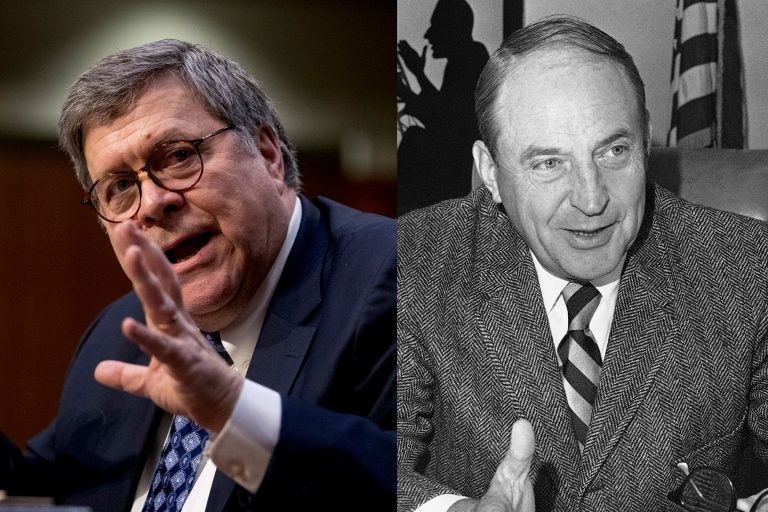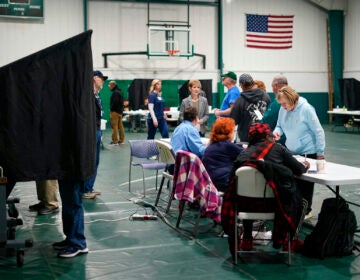Can William Barr live up to the standards of William Saxbe?
The big question now is whether William Barr can meet the standard set by William Saxbe. The preliminary verdict appears to be, "Meh."

Attorney General nominee William Barr (left) testifies during a Senate Judiciary Committee hearing on Capitol Hill in Washington, Tuesday, Jan. 15, 2019. In this Sept. 2, 1970 file photo, Sen. William B. Saxbe, R-Ohio, serving his first term in the Congress, poses at Capitol Hill. (Andrew Harnik/AP Photo and AP Photo, file)
During the first season of “True Detective,” Matthew McConaughey’s disgruntled cop famously intoned: “Time is a flat circle. Everything we’ve ever done or will do, we’re gonna do over and over and over again.”
That remark came to mind yesterday as I watched William Barr’s Senate confirmation hearing. At my age, I am blessed (or cursed) with a long institutional memory, and Barr’s bid to become Donald Trump’s new attorney general, in the midst of an historic scandal, prompted flashbacks to Dec. 12, 1973 — when I, as a newly-minted adult, watched TV news coverage of a Senate confirmation hearing that featured Richard Nixon’s choice for attorney general.
William Saxbe, a “law and order” Republican senator from Ohio, auditioned for the job that day in the midst of an historic scandal — and he fielded precisely the same questions that Barr faced yesterday: Would he defend the integrity and independence of the Justice Department, FBI, and the special counsel? Did he believe that the special counsel’s probe was legitimate? Would he shield the special counsel from a president who lied with impunity and flouted the rule of law? Would he protect the special counsel from an unwarranted firing?
Saxbe repeatedly answered in the affirmative. And to underscore his commitment, he later shared the witness table with Watergate special counsel Leon Jaworski. Saxbe said, “I will do anything in my power not to see the investigation impaired.” He said that Jaworski would be “completely independent.” When asked whether “executive privilege” can be invoked by a president to cover up evidence of wrongdoing, Saxbe replied: “I think it cannot.” He pledged to “vigorously support” Jaworski’s probe of “crimes and misdemeanors in the White House … It is a covenant that I have made with myself without any reservation … that the chips were going to fall where they may, regardless of who is involved.”
And Saxbe kept his word. Free from interference, Jaworski followed the trail to Nixon, Congress launched impeachment hearings, and Nixon ousted himself in August ’74.
So the big question now is whether William Barr can meet the standard set by William Saxbe. The preliminary verdict appears to be, “Meh.”
Barr said yesterday that special counsel Robert Mueller should be allowed to complete his work. But he didn’t pledge to publicly release Mueller’s full report, insisting only that he’d practice “as much transparency as I can consistent with the law,” thus giving himself ample wiggle room to suppress some of its content.
He said yesterday that Mueller is a “straight shooter” for whom he has the utmost professional respect, and he said he wouldn’t fire Mueller unless there was “pretty grave” justification — a circumstance that he deemed “unimaginable.” But he said that if the Justice Department’s ethics advisers urge him to recuse himself from overseeing Mueller (because he previously wrote a memo arguing that a key aspect of Mueller’s probe is “fatally misconceived”), he would not necessarily obey the advice. In his words, “I am not going to surrender my responsibilities.”
He said yesterday that any attempt by Trump to meddle with the Mueller probe would make things worse for Trump: “If a president attempts to intervene in a matter he has a stake in to protect himself, that should first be looked at as a breach of his constitutional duties.” He also rejected Trump’s “witch hunt” rhetoric. But he floated the idea of merely summarizing Mueller’s findings (but not necessarily all of Mueller’s findings) in a report of his own to Congress: “The attorney general, as I understand the rules, would report to Congress about the conclusion of the investigation. And I believe there may be discretion there about what the attorney general can put in that report.”
All told, Barr at first glance falls short of the Saxbe standard. After that ’73 confirmation hearing was over, Saxbe even stood with Jaworski in front of the press, and when asked whether he’d protect Jaworski’s independence, he replied, “An unqualified yes.” A reporter then asked what would happen if the scandal probe led to Saxbe’s “old friends high in the administration.” Saxbe replied, “I don’t have any old friends high in the administration.” Barr, by contrast, decided it was a fine idea to share his anti-Mueller memo with lawyers high in the Trump administration; indeed, he reportedly discussed the memo with Trump prior to his nomination.
So he appears to be a mixed bag. There was enough in yesterday’s testimony to soothe Trump — but also enough to unnerve Trump. Plus, he said this: “I believe the Russians interfered or attempted to interfere with the election, and I think we have to get to the bottom of it.” If Trump starts rage-tweeting about “Wimpy Willie,” that’s when we’ll know he’s a Saxbe.
WHYY is your source for fact-based, in-depth journalism and information. As a nonprofit organization, we rely on financial support from readers like you. Please give today.




